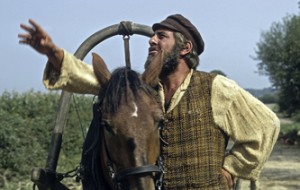
Mar 25, 2013
Tradition… TRADITION!
by Clinton R. Brown
In a 1971 movie musical, Tevye, a Jewish papa, says, “Without traditions, our lives would be as shaky as… a fiddler on the roof.”
It is hard to deny the strength of some traditions that often help bind together a community. People seem comforted by the continuity of traditions; they can be a powerful tool in reinforcing values. However, if over time they become irrelevant, or their meaning does not translate, they could become more of a barrier than a facilitator in transmitting those values.
You may recall, in Acts chapter 15, the young Church was in a crisis over traditions. Jewish believers in the risen Christ had practices that they felt were integral to the proper worship of God. They felt all Christians should be circumcised (and essentially become Jewish in culture) in order to have righteous lives, and be fit to follow the Messiah.
Had the council in Jerusalem decided otherwise, we might still feel under obligation to become Jewish to follow Jesus. However, the leaders of the early Church came to a consensus that old covenant practices were not necessary for salvation, and the Gospel was as open to the Gentiles as it was to the Jews.
Though the Jerusalem Council settled the issue that people of all cultures could adapt to follow Jesus without adding extra-Biblical practices, Christians through the ages have tended to bring our own cultural preferences to how we introduce the worship of God to other people. Not surprisingly this has created tension, rejection, and confusion for those who otherwise may have more readily understood and accepted the life-changing, yet simple, relationship with Jesus.
In 2012, when I went to see new SDB congregations in South Sudan and Ethiopia, I found believers just one generation removed from a lifestyle of tribal cattle herdsmen. They were now seeking assistance to construct Western-type worship facilities and obtain materials so they could better mimic Western worship styles. The idea of “Church” had been presented heavily encased in a Western cultural mindset. We are still trying to explain that they can follow Jesus appropriately within the already God-glorifiable aspects of their society.
As it happened, that same year, I was also privileged to visit the SDB church in Shiloh, New Jersey as they celebrated their 275th anniversary. One aspect of the celebration was reviewing excerpts from their considerable historical records.
A recollection that I found particularly intriguing was on the struggle the congregation faced over the all too familiar issue of the use of organ music in worship. As usual, the opposing views divided up much along the lines of age. Those more sympathetic with the younger culture were firm that change was necessary, while the traditionalists felt they would no longer be able to worship if new instruments were brought into the sanctuary. Interestingly, this was much earlier in the Shiloh congregation’s history, and the battle was over bringing IN an organ, and not replacing it with drums and guitars.
All the way back at the Jerusalem Council they established that in our worship and obedience to God we should always use the touchstone of his Word—by the guidance of the Holy Spirit—to evaluate what we do and how we do it.
I believe Tevye was correct that life is, indeed, shaky as a fiddler on a roof. But selfishly clinging to tradition can easily pull us off center of where God wants us to be, as unlovingly jettisoning them can throw us in the other direction. Let’s remember to remove our will and desires, as we join Him in His mission to love others as Christ has loved us—starting in our own congregations and reaching to the ends of the earth.
This people honors me with their lips, but their heart is far from me; in vain do they worship me, teaching as doctrines the commandments of men. (Matthew 15:8-9)


